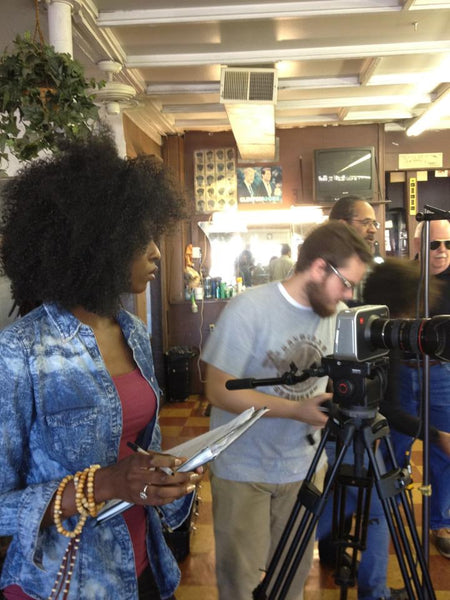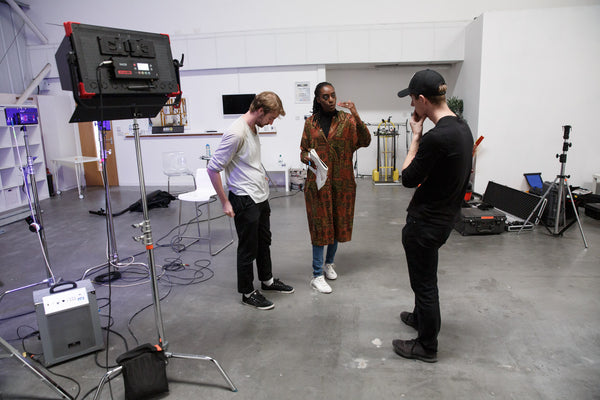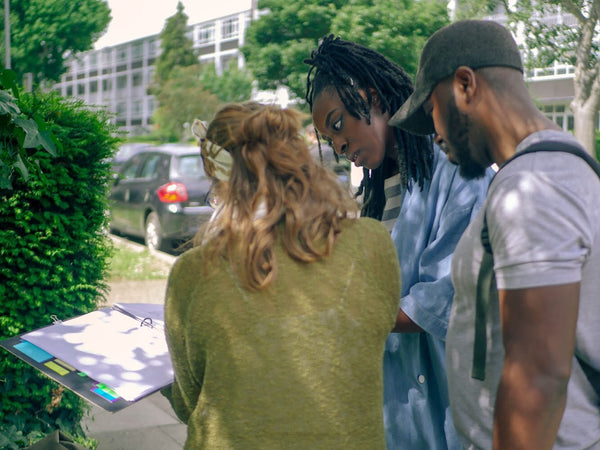Sheila Na'imah Nortley: Screenwriter & Filmmaker
Sheila Nortley has written and produced several internationally award-winning productions including Zion, Victim and feature film David is Dying. In 2011 with her colleague Najan Ward, she founded Kingdom Drama School which is still going strong - now run by Ashley Walters himself!
In 2013 Nortley shot the independent hit Sable Fable which went on to win Best Film at the prestigious American Black Film Festival awards in Miami, Florida. In 2016, she won the Woman of the Future award in Arts & Culture for her work in film and was invited to Buckingham Palace.
The following year her film Limbo was shot in Norfolk, Virginia and selected at various international festivals included Cannes Pan-African Film Festival. Following her invitation to 10 Downing Street to meet the Prime Minister, 2018 saw her become an Associate Fellow of the Royal Commonwealth Society for her determination in committing to the Society’s mission of promoting the values of the Commonwealth. In 2018 feature film The Strangers was shot and principal photography for feature film A Game of Two Halves is scheduled for November 2019 both penned by Nortley. She is currently writing for Channel 4 series and a Netflix series going into development 2020.
She sat down with the Brown Skin Essentials team to discuss her career, and why it is so important to focus on race & inclusivity in her filmmaking.
1) Why is race and inclusivity so important to your storytelling?
Because we need to get to the point where it isn’t considered at all. Including people in a narrative despite their racial background should be normal and expected, it shouldn’t be something that needs to be campaigned for. But the reality is that it is. I honestly believe that we were created as different races and nations and so on, so that we might get to know one another and appreciate each other’s differences. We need more of this on the screen to create tolerance, to enrich ourselves and our understanding of what it means to be a human being.
2) What film(s) are you working on now that tie in these themes?
I’m currently in production of a feature film called A Game of Two Halves which is set in India. For me, it was my first time writing about a character from a culture that I was not familiar with. Most of my films have been set against the backdrop of black Britain, which I (obvs) have insight some into. But the thing is, with this movie I wasn’t writing about a culture. Im not an encyclopaedia. I’m not even a journalist. I was writing about people. Again, something I have insight into, right? (Laughs). As obvious as it sounds people are just people: most of us have the capacity to feel love and to feel the pain, we all bleed when cut, we all feel sad when hurt, we were all born from our mothers. And I just had to colour the story with authenticity and awareness of the characters cultural background but with the authenticity of writing another human being, another character.
3) We are coming off the back of Black History Month, which is traditionally a time to celebrate the positive contributions of the Afro-Caribbean community. How far has the UK come in your opinion?
I’d ask the victims of the Windrush scandal.
4) Do you think there are two UK experiences – that of the white population and a different one for minorities? How do we create more understanding?
I don’t think it’s is black and white. The experience of the majorities will certainly be different to that of the minorities, but equally the experiences of minority groups are also vastly different from each other. For example the black experience is incomparable to the Arab experience though both ethnic minorities. The experience of gay men, I imagine, is significantly different to the experience of lesbian women even though they are both minority groups based on their sexuality . So there is certainly a plethora of UK experiences and I suppose the beauty of storytelling is you can start to share and enrich our understanding of both individual experiences and shared cross-cultural experiences.
5) Has it been difficult getting access to opportunities as a black, Muslim female in your profession or worked in your favour?
That’s a tricky question. I know there are now initiatives which specifically aim to involve more minorities. At the same time I really want to transcend some of the labels which are used to categorise me and to be able to exist as ‘a writer’ with the same liberty as my peers who don’t have to have a hyphenated experience. I am a black writer, a female writer, a Muslim writer but don’t feel the need to always segment myself, these are parts of a whole. As a filmmaker, I’d like for my crew to judge me on the merit of my character, conduct and experience as opposed to my race, gender or religion. D’you know what I mean? That’s a much fairer criteria for you to rate someone in their profession. But I know this is not the case. I’ve faced microaggressions because I’m a black Muslim woman in a white male dominated industry. But I keep it moving and focus on telling the stories that I need to tell.
6) Are you seeing hopeful signs of changes? If so, what are they?
Definitely, there’s been a huge buzz amongst my friends and colleagues and everyone is working really hard both in the Independent arena and in the mainstream to tell great stories. We are trying to broaden the narrative when it comes to representation of minority groups and it’s exciting to be able to do so and to be pioneers of that movement. Talent has been recognised within the community and outside of the community and it’s a really really exciting time.
It’s one of the most powerful mediums in the world and a driver for change through the entertainment industry. It’s art and it’s business and it’s propaganda and it’s fun.



